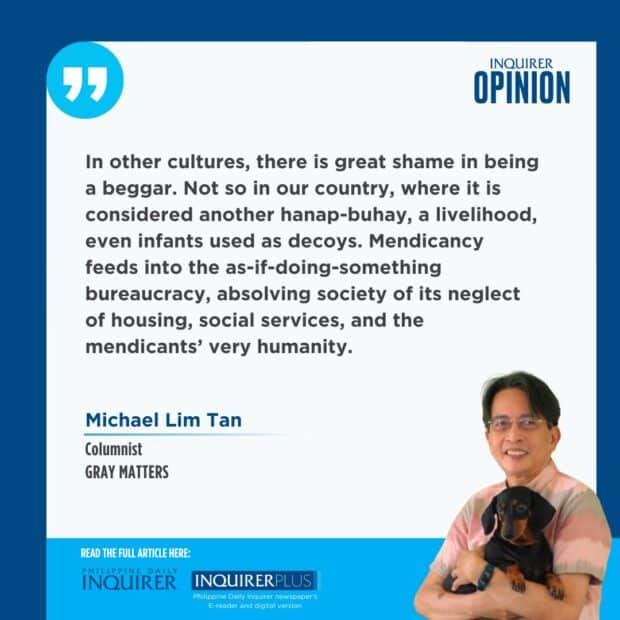
You may have read about the woman who died delivering her baby on a street in Cebu City last Aug. 14.
It was hard figuring out the facts and events given the way newspapers wrote about the tragedy, starting with the poor woman’s name (reported as “Tampus,” “Tangos,” “Mantos”), age (35, 39), even the number of pregnancies she had (seven in most accounts but one said she had eight from her first husband, who has since died, and four from her current partner).
What was so distressing about the sloppy reporting was it being so emblematic of the way we look at such tragedies: “just” another story of poverty, who cares about the woman’s name, her life circumstances?
The first reports ended with her death, mentioning a traffic enforcer and a nurse whose help the woman had turned down. One report said she even ended up assaulting a doctor. Her reasons for not wanting to go to the hospital? She was afraid of injections, said one report. Another said she felt the hospitals were going to “experiment” on her.
It was only after a few days that follow-up reports came out, mentioning Cebu City’s mayor ordering a revamp of the Anti-Mendicancy Board, but without details about what the revamp would involve. Instead, the mayor was quoted as mentioning a halfway house available for beggars in Barangay Taptap, an hour away from downtown Cebu, which the mendicants prefer.
Mendicants. Such a fancy term, also used in Presidential Decree No. 1563 issued by Ferdinand Marcos in 1978 banning begging (there, finally, the word), with penalties prescribed for those who beg and those who give alms. The law’s enforcement, from what I’ve seen over the last 50 years, consists of occasional round-ups of beggars, usually around Christmas.
The first time I read the story, I also wondered about all the safeguards and social support supposedly in place for expectant mothers among the poor. We do have the Pantawid Pamilyang Pilipino Program, a conditional cash transfer program that provides monthly allowances to households depending on how many children there are. The allowances are supposed to ensure that the children remain in school, providing P300 a month for children eligible for elementary school, P500 for junior high school, and P700 for senior high school.
The mothers also get to attend family development sessions on education, health, nutrition, and responsible parenting. Pregnant mothers have to attend prenatal and postnatal workshops.
The government’s prenatal and postnatal workshops are supposed to reduce the risks of pregnancy complications and, if the mother is already at risk, to ensure that they deliver in a hospital. Some zealous municipalities and cities even have passed local ordinances forbidding mothers from delivering at home.
But it seems street dwellers are not eligible for the Pantawid program. You need an address and a way to get the money. One photograph showed this poor mother’s address: cardboard laid out on the street where death stalked her.
The ”ber” months are here, which may as well be called the mendicancy months, as small armies of mendicants come streaming into cities, many from indigenous communities, the numbers growing across the years as more and more of them are displaced from their ancestral homes.
The mendicants are now well-organized, some even coordinated with local government units, who provide temporary residence for them in designated places. I visited one such place, specifically for Negritos, in Quezon City, with quite a collection of “alms” in kind—leftover meals from fast-food restaurants, canned goods, and cash.
It makes the “donors” feel better about the extravagance that comes with Christmas, sparing some loose change (barya), not wasting the excess food from the restaurant. When I have Western friends visiting, especially those with children of their own, the scenes break their hearts and they have to give, and not just coins. After I had my own kids, the same thing happened.
I haven’t told my kids about the death in Cebu and how the tragedy is linked to mendicancy. Poverty is a convenient catch-all explanation; I have been to countries considered to be much poorer than we are but where you will not see mendicancy as it exists in the Philippines, all too well organized, all too ingrained into our culture.
In other cultures, there is great shame in being a beggar. Not so in our country, where it is considered another hanap-buhay, a livelihood, even infants (or, the latest, spotted a few weeks ago on Araneta Avenue in Quezon City, a puppy) used as decoys.
Mendicancy feeds into the as-if-doing-something bureaucracy, absolving society of its neglect of housing, social services, and the mendicants’ very humanity.
mtan@inquirer.com.ph

